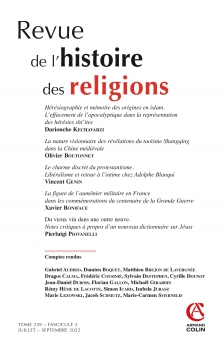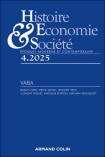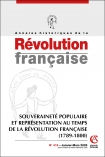
REVUE DE L'HISTOIRE DES RELIGIONS (3/2022)
Pour acheter ce numéro, contactez-nous
Recevez les numéros de l'année en cours et accédez à l'intégralité des articles en ligne.
Plusieurs décennies avant la thèse de Max Weber (L’Éthique protestante et l’esprit du capitalisme), l’économiste Adolphe Blanqui, mutatis mutandis, contribue à une réflexion qui traverse tout le xixe siècle, en vertu de laquelle économie libérale et morale protestante sont les deux sources de la prospérité. L’analyse, menée selon une approche peu prisée en histoire économique et un corpus peu familier au champ des sciences religieuses, est portée sur la corrélation entre intolérance religieuse (valeur sensible aux Protestants, dont Blanqui, cas ici traité, est un admirateur critique), et intolérance économique (le protectionnisme). Blanqui propose de sortir de cette impasse au moyen de l’instruction morale dans le cadre de l’intime et de l’industrie.
Several decades before Max Weber’s thesis (The Protestant Ethic and the Spirit of Capitalism), the economist Adolphe Blanqui, mutatis mutandis, contributes to a reflection that runs through the entire 19th century, according to which liberal economics and Protestant morality are the two sources of prosperity. The analysis, carried out according to an approach that is not very popular in economic history and a corpus that is not very familiar to the field of religious sciences, is focused on the correlation between religious intolerance (a sensitive value for Protestants, of whom Blanqui, whose case is discussed here, is a critical admirer), and economic intolerance (protectionism). Blanqui proposes a way out of this impasse by means of moral instruction within the framework of intimacy and industry.

